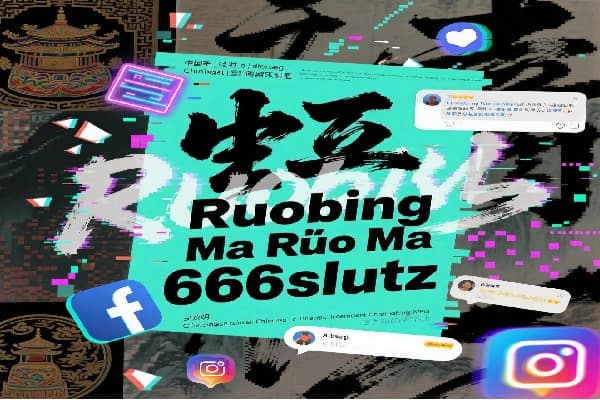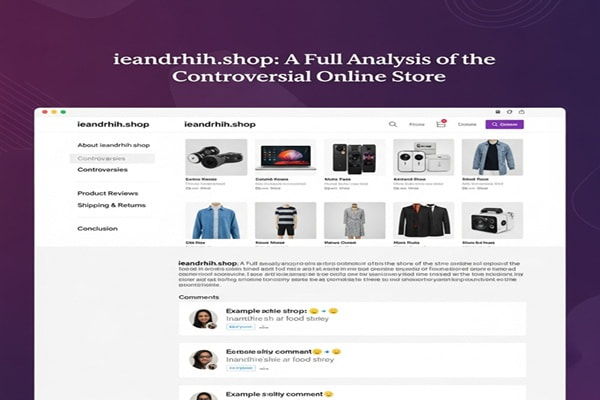Impact of Unique Digital Identities: Exploring Ruobing Ma Ruo Ma 666slutz

In our hyper-connected digital world, your username isn’t just a login detail—it’s often your first impression, your badge of identity, and sometimes even your personal brand. Whether you’re gaming, posting on forums, or joining social platforms, names like “Ruobing Ma Ruo Ma 666slutz” aren’t as random as they seem. They’re layered, intentional, and deeply tied to how we present ourselves online.
So, what’s behind these quirky and sometimes eyebrow-raising handles? Let’s unpack the meaning, cultural significance, SEO power, and online influence of unique usernames—and why they matter more than you think.
What’s in a Username? Let’s Decode “Ruobing Ma Ruo Ma 666slutz”
At first glance, “Ruobing Ma Ruo Ma 666slutz” might sound like a chaotic mashup of letters and numbers—but there’s more going on beneath the surface.
Here’s how it breaks down:
-
Ruobing Ma / Ruo Ma: These look like variations of a personal name, possibly Chinese in origin. Using one’s real name or a modified version is a way to maintain a connection to cultural identity or simply make the username feel more personal.
-
666: This number shows up a lot in gamer tags and digital usernames. It might seem edgy to some (thanks to its pop-culture connection to the “number of the beast”), but for many, it’s just a cool or lucky number—or used purely for aesthetic flair.
-
Slutz: This might look provocative, but online, words like this are often used ironically. It could be a playful, tongue-in-cheek expression that subverts the original meaning or makes a bold identity statement.
In short? This username isn’t random—it’s deliberate. It tells a story, sparks curiosity, and makes the person behind it stand out in a sea of “user12345” clones.
Why Unique Usernames Matter in Digital Spaces
When you’re interacting online—especially where your real name isn’t required—your username becomes you. It shapes how others perceive you and influences how you move through digital spaces.
Here’s why people craft usernames like “Ruobing Ma Ruo Ma 666slutz”:
-
To be memorable
A distinctive handle can be a conversation starter or just a way to make sure people remember you. -
To express identity
Whether it’s cultural pride, a love of dark humor, or a reference to pop culture, usernames can reflect deep personal meaning. -
To join or signal community
Specific styles of usernames can suggest that someone is part of a particular fandom, subculture, or online movement.
Usernames as Digital Self-Expression
Just like fashion, usernames are a form of self-expression—especially in spaces where physical appearance or real-world context is missing.
A name like “Ruobing Ma Ruo Ma 666slutz” could convey:
-
Humor
-
Cultural pride
-
Defiance or rebellion
-
An embrace of internet irony
-
Or even a layered inside joke within a specific online community
It’s a little digital performance, telling the world: this is who I am—or at least who I want to be online.
How Usernames Shape Online Interactions
Ever scroll through Reddit or a gaming lobby and find yourself giggling—or raising an eyebrow—at someone’s username? That reaction matters.
Usernames can:
-
Set the tone for how others approach you
-
Spark conversations (curious about the meaning?)
-
Build trust or mystery, depending on the name
-
Create anonymity or exposure, based on what it reveals
A creative, unusual name like “Ruobing Ma Ruo Ma 666slutz” might make someone appear bold, humorous, or even intimidating—depending on the context. The point is, it says something, and that’s powerful.
The Hidden SEO Potential of Weird, Unique Keywords
Let’s switch gears for a second and talk SEO (Search Engine Optimization)—because yes, even usernames can play a role here.
If you run a blog, post on forums, or stream under a name like “Ruobing Ma Ruo Ma 666slutz,” it becomes a searchable term. That uniqueness? It’s gold for SEO.
Why?
-
Low competition: Nobody else is using that exact phrase. That means if someone Googles it, your content will probably show up first.
-
High intent traffic: People searching for such specific terms are often deeply interested or already familiar with your content or persona.
-
Personal branding: You essentially own that keyword online.
How to Optimize Content for Unique, Unusual Keywords
If you’re a content creator, digital marketer, or even just someone looking to build an online presence, learning how to work with weird usernames or identifiers in your content can give you an edge.
Here’s how to do it:
1. Embed the Keyword Naturally
Don’t just dump “Ruobing Ma Ruo Ma 666slutz” all over your blog or video description. Use it naturally:
-
Mention it in intros or bios
-
Include it in alt text, meta descriptions, or headings (like this one!)
-
Use it when telling the story behind the name
2. Provide Context
Explain the meaning or origin of the username somewhere in your content. This helps Google (and readers) understand its relevance.
3. Create Niche Content Around It
For example:
-
“Why I Chose the Username Ruobing Ma Ruo Ma 666slutz”
-
“The Story Behind My Online Persona”
-
“How Unique Usernames Affect Your Online Identity”
4. Use Analytics
Track how many people are finding you via that keyword. If the number starts climbing, you know it’s working—and you can double down on creating similar content.
Also Read : Charalabush How to Buy: A Step-by-Step Guide for Beginners and Experts
Cultural Layers: Why Numbers Like 666 and Terms Like “Slutz” Get Used
Let’s talk symbolism for a second.
-
666: While often associated with dark or rebellious themes, it’s also just an attention-grabbing number. In Chinese internet culture, 666 actually means “awesome” or “cool”—especially in gaming. It’s like saying “GG” or “well played.”
-
Slutz: This is likely not meant to be offensive. In fact, it could be an example of reclaiming a term or turning it into something humorous. Think of it like usernames that play off “villain,” “witch,” or “trash”—they’re meant to be ironic or edgy, not literal.
Usernames like this often blur the lines between personal branding and satire, especially in meme-heavy online spaces.
Conclusion: It’s Not Just a Username—It’s a Digital Identity
At the end of the day, names like Ruobing Ma Ruo Ma 666slutz are more than just online handles. They’re loaded with meaning, whether personal, cultural, humorous, or symbolic. And in a digital space where first impressions are made in milliseconds, they have the power to shape how you’re seen, heard, and remembered.
Understanding the psychology, creativity, and SEO strategy behind such usernames gives us deeper insight into how identity works online. So, whether you’re creating your own distinctive handle or just navigating spaces filled with them—know that there’s often more than meets the eye.
FAQs About “Ruobing Ma Ruo Ma 666slutz”
Q: What does “Ruobing Ma Ruo Ma 666slutz” actually mean?
It appears to be a creative username blending Chinese-sounding names (Ruobing Ma, Ruo Ma), the culturally loaded number 666, and a playful twist on the word “sluts.” It’s likely designed to stand out and express personality.
Q: Why are usernames like this so popular?
They’re bold, unique, and memorable—everything you need to get noticed in a crowded digital world. Plus, they’re often tied to humor, cultural nods, or inside jokes.
Q: How does your username impact your online presence?
It shapes first impressions, sets the tone for interactions, and can even influence how people engage with your content or persona.
Q: Why do people use numbers like 666?
Depending on the culture, it could symbolize rebellion, humor, or even positivity. In some online circles, it’s just considered a “cool” number.
Q: Is there a marketing or SEO advantage to having a weird username?
Absolutely. Unique names can rank easily in search results, making them powerful tools for personal branding—especially if you build content around them.



